 Petzlover
Petzlover Both Domestic Longhaired Cat and Ginger Tabby are originated from United States. Both Domestic Longhaired Cat and Ginger Tabby are of same weight. Both Domestic Longhaired Cat and Ginger Tabby has same life span. Both Domestic Longhaired Cat and Ginger Tabby has same litter size. Both Domestic Longhaired Cat and Ginger Tabby requires Moderate Maintenance.
Both Domestic Longhaired Cat and Ginger Tabby are originated from United States. Both Domestic Longhaired Cat and Ginger Tabby are of same weight. Both Domestic Longhaired Cat and Ginger Tabby has same life span. Both Domestic Longhaired Cat and Ginger Tabby has same litter size. Both Domestic Longhaired Cat and Ginger Tabby requires Moderate Maintenance.
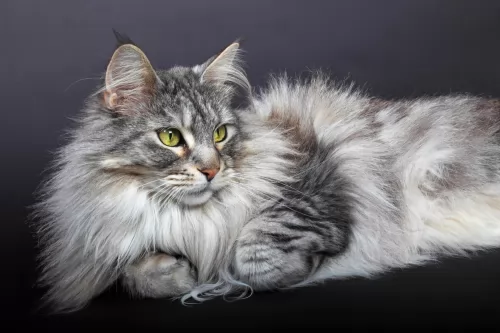 The Domestic Longhaired cat came about because of various attempts by breeders to bring in certain Persian cat varieties in the American Shorthairs.
The Domestic Longhaired cat came about because of various attempts by breeders to bring in certain Persian cat varieties in the American Shorthairs.
The cat comes from champion bloodlines but one of the most remarkable traits of the Domestic Longhair cat is that they are just typical cats with long hair. In other words, Domestic Longhairs are a product of various cat breedings and it is thought they arrived in the USA with the early settlers.
They shouldn’t be confused with the purebred American Longhair cat. The ancestry of the Domestic Longhair cat is unknown but for people who own them, they are a longhaired cat that becomes special to their owners. The cat isn’t recognized by the larger cat organizations.
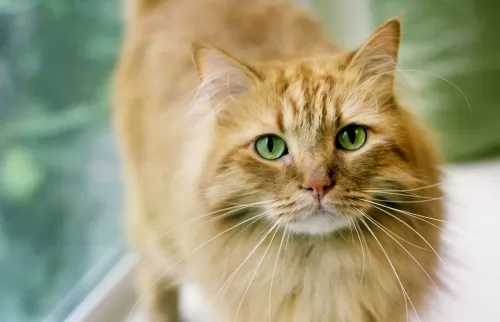 All ginger cats are tabbies – they have spots and stripes on their coat. The tabby pattern is a common wild type, and it is believed that medieval cats were tabbies.
All ginger cats are tabbies – they have spots and stripes on their coat. The tabby pattern is a common wild type, and it is believed that medieval cats were tabbies.
Most paintings and medieval manuscripts show them to be tabbies. Many people believe that these ginger cats come from a particular breed but this isn’t the case.
Ginger Cat Appreciation Day takes place in September. These cats, known as Orange Tabby Cats are very popular and they can actually have a yellow-, orange or red fur.
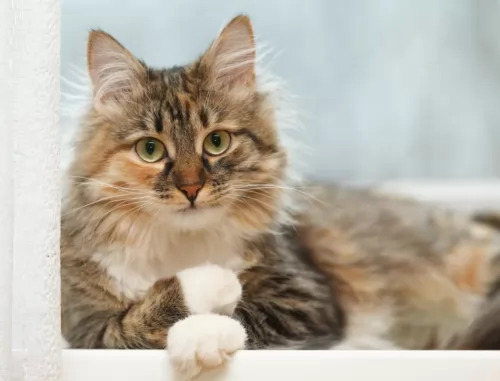 These Domestic long-haired cats are hugely popular in the United States. They can be of any color and the coat can have different patterns too, including bi-color, tortoiseshell and tabby.
These Domestic long-haired cats are hugely popular in the United States. They can be of any color and the coat can have different patterns too, including bi-color, tortoiseshell and tabby.
With his muscled, athletic body he can weigh between 3 and 6kg. He can have a variety of eye colors, ear sizes, and shapes Essentially, their size and shape is influenced by the breed that dominates.
These are just your regular, balanced cats and they make splendid pets for first-time cat owners, single pet owners, those with kids in the home and seniors. You can’t really tell how their personality will be and some will be more quiet than others and some more loving than others too. A lot depends on how you raise- and socialize your cat.
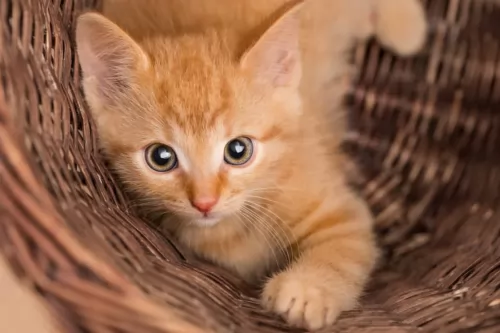 Ginger cats have different patterns to the short or long silky coats – mackerel or striped, spotted, patched, ticked, and classic.
Ginger cats have different patterns to the short or long silky coats – mackerel or striped, spotted, patched, ticked, and classic.
In fact the Ginger Tabby isn’t referring to a specific cat breed but rather a distinct color pattern. These cats get their ginger coloring from the pigment pheomelamin, the pigment red-headed humans also have.
The Ginger Tabby can range in size so generally they’re between 3 -6kg in weight. It also seems that a higher number of ginger or orange tabbies are male, put down to genetics. The eyes of the cat can be green, gold or copper.
The Ginger Tabby just loves being around his human family and to show his pleasure, you’ll hear loud purring.
They are affectionate cats and aren’t afraid to show you. These cats have a reputation for being friendly but you also have to bear in mind that a cat’s personality depends on their early socialization with people and other cats.
The Ginger Tabby is an independent, bold, courageous cat with a feisty nature.
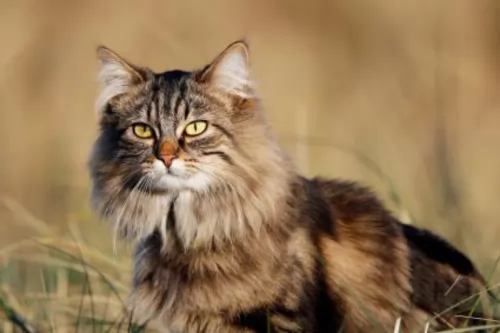 Domestic Longhairs are such wonderful cats and slot into a host of different lifestyles.
Domestic Longhairs are such wonderful cats and slot into a host of different lifestyles.
They are generally content cats with the different lifestyles they find themselves in. Some are smart, some playful, some quiet and some naughty, some are very vocal and some are content to be lap cats.
They're all different but they all have needs and concerns – to be part of a loving human family and to be treated with love, care and respect for the companionship they offer.
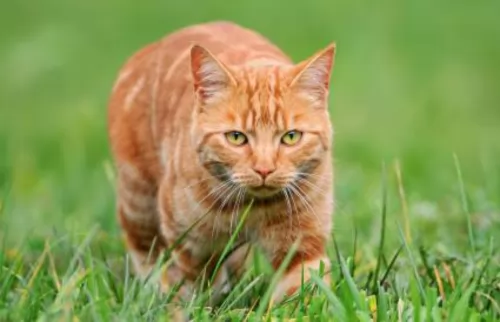 The link between personality and hair color is a talking point among humans, and so it is with cats.
The link between personality and hair color is a talking point among humans, and so it is with cats.
The Ginger Tabby, with its marmalade shade coat is feisty, playful, bold, courageous, and interesting.
Certainly, when you bring this cat into your home, not only are you going to have a beautiful cat but one that is full of character and charm.
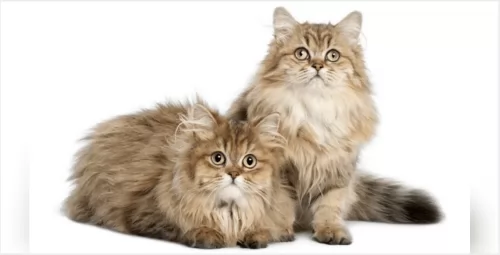 It is their mixed breeding that ensures that the Domestic Longhaired cat doesn’t have any health issues. Like any cat, things such as arthritis, cancer, diabetes and kidney disease can plague your cat.
It is their mixed breeding that ensures that the Domestic Longhaired cat doesn’t have any health issues. Like any cat, things such as arthritis, cancer, diabetes and kidney disease can plague your cat.
A good diet, exercise, lots of love and care can all help to ensure your kitty kat doesn’t succumb to anything that your vet can’t handle.
As soon as your cat shows any sign of illness, get him to the vet. If you look after your cat well, he can avoid a lot of vet visits and can reach 15 to 20 years of age.
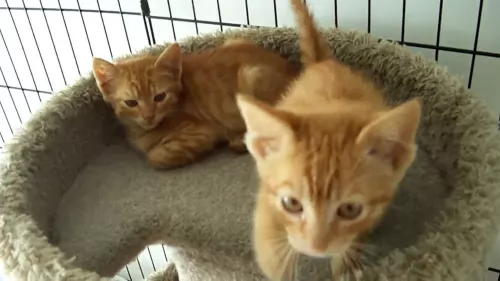 Guard your ginger tabby against eating too much and guard against a diet that is nutritionally inadequate as this contributes to poor health.
Guard your ginger tabby against eating too much and guard against a diet that is nutritionally inadequate as this contributes to poor health.
Cats are carnivores and live on meat but you can speak to your vet about giving your cat the chance of a long life by feeding him proper amounts of a healthy diet.
Make sure he also gets plenty of exercise. Offer him things to climb on, such as an indoor climbing tree so that he can exercise when you’re not there. This is important for helping him stay physically and mentally fit.
All cats are susceptible to bacterial and viral infections. Deadly diseases like this are preventable through vaccination. Vaccines offer protection from other dangerous diseases like feline leukemia virus.
All kinds of parasites – internal and external can invade your cat and make him miserable and sick and a trip to the vet is imperative.
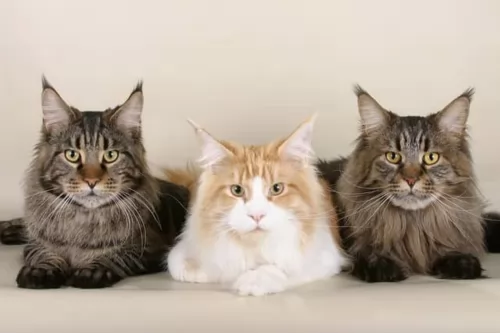 The hair of the Domestic Longhair will need to be tackled and you will need a firm brush to gently brush your cat once a week. This ensures the hair remains silky and tangle-free.
The hair of the Domestic Longhair will need to be tackled and you will need a firm brush to gently brush your cat once a week. This ensures the hair remains silky and tangle-free.
Remember, there are always professional cat groomers who specialize in grooming cats and ensuring their teeth, inside of ears, their nails and their fur is in tip-top condition.
Keeping your cat healthy is always going to require a trip to the vet. Your Domestic Longhair is going to require certain vaccines and deworming to ensure he remains free of deadly cat diseases. Also, if your cat is acting in a lethargic, ‘sick’ way, it could well be a sign that he is ill and a trip to the vet will be imperative as the condition could become worse.
To ensure your cat has the best chance at health, make sure you feed him well. Gut health is absolutely imperative and feeding your cat too many carbs will give him plenty of digestive problems.
A cat is a carnivore – a meat eater – and therefore his food needs to be meat. A kitten will require 4 small meals a day and an adult cat – over the age of 1 year – will require 2 meals a day. Any questions you have about feeding your cat can be answered by your local veterinarian.
Speak to your vet about spaying or neutering your Domestic Longhaired Cat as this will prevent unwanted kittens, particularly if your cat is allowed outdoors and wanders off.
Also, neutering and spaying have a host of health benefits for your cat and it also improves their personality.
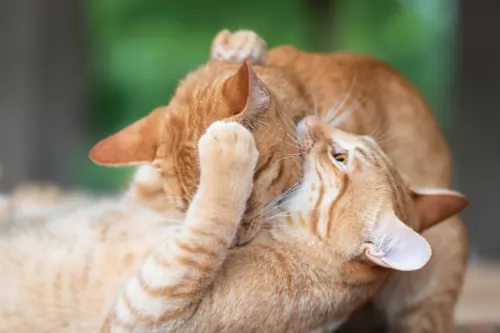 Have your Ginger Tabby cat spayed or neutered. In females, the ovaries and uterus are removed and in males the testicles are surgically removed.
Have your Ginger Tabby cat spayed or neutered. In females, the ovaries and uterus are removed and in males the testicles are surgically removed.
This common op has health benefits and decreases the likelihood of certain types of cancers in your pet. Very importantly it eliminates the possibility of your pet becoming pregnant or the male cat getting out and fathering unwanted litters. The world has too many unwanted kittens and cats as it is.
Brushing your Tabby cat will help with shedding. If you brush your Tabby once a week, you’ll remove all those loose hairs that gives your cat an ungroomed look. Cats shed more in Spring and Autumn and then you may want to increase your brushing to twice a week. Bear in mind that if your cat has shedding which is abnormal it could well be a nutritional thing. Diet is everything. He may not be getting the right mix of ingredients. Speak to your vet as your Tabby may be requiring more of certain vitamins in his diet.
Clip your cat’s nails and make a point of checking inside his mouth for bad teeth and inside his ears for wax and dirt buildup.
Your Ginger Tabby will need food and water bowls, litter box, sleeping place, collar, and toys as well as a carrier box for when he needs to get to the vet.